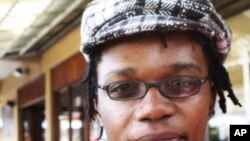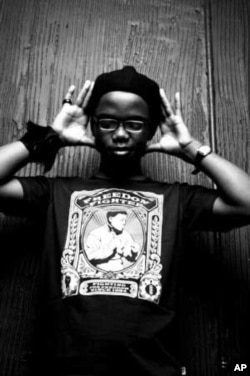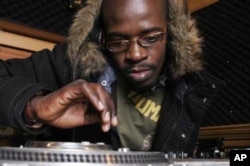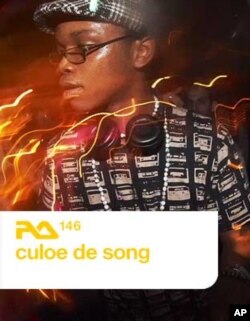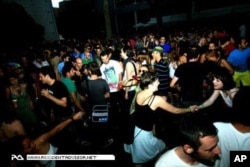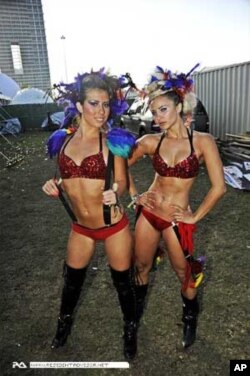The unassuming, bespectacled young man sits at a restaurant table on a busy street corner in Johannesburg’s trendy Melville suburb. He sips coffee, and reflects on his “chaotic but beautiful” life of the past few years. He talks quietly about how he’s become one of South Africa’s great recent musical exports. He laughs at how his name has become one of the most mentioned in international house music circles.
“Culoe, in my language – Zulu – it means ‘song.’ My artist name, Culoe De Song, is meant to make the transition from Zulu ‘song’ to English ‘song.’ My real name is Culoelethu, which means ‘our song’ in Zulu.”
From the outset, it’s clear that Culoelethu Zulu, famous in clubs across the globe as DJ Culoe [KOOL-oh] De Song, is no ordinary 19 year old.
“I really appreciate the fact that I was born with a love for music, regardless of [my] name,” he says.
De Song is articulate, quietly confident and yet modest. “I am still very young. I have a lot to learn about everything in life, really, not just music,” he says.
But his debut album, A Giant Leap, has led some music journalists in South Africa to call him one of the country’s greatest-ever musical prodigies. He’s been nominated for the country’s highest entertainment award. He’s played to audiences around the world, to rave reviews in international house music magazines. House is a style of electronic dance music that emphasizes percussion. It began in the United States in the 1980s and is heard in clubs around the world. Some of De Song’s music is high on club play lists.
DJ Kabila starts it all
De Song says the South African east coast city of Durban “can be blamed” for sparking his passion for house music. He moved to the country’s second-largest metropolis six years ago from his birthplace, the small Kwazulu/Natal town of Eshowe.
“I was in school [in Durban]. When I got to the city, I connected with the music and club scene. For the first time I was able to experience those things first hand,” De Song reflects. “I bought myself some gear and started setting myself up as an amateur DJ.”
Soon, he says, he got a “very lucky break.” At a gig, he met a man destined to become his “great friend and mentor. His name was DJ Kabila; he was a (top) DJ at that time. He taught me how to play vinyl; he taught me a lot of things about the industry.”
Kabila showed him how to DJ at private parties. De Song was a fast learner, quickly mastering complex processes. His rapid progression meant he soon began producing his own house music, in late 2006.
“I’ve always liked computers; always been into high tech stuff,” De Song says. “Playing around with that kind of software and being able to produce something that sounds like music was a pretty cool thing for me. And then it got serious: I started producing serious music.”
‘Fireball’ of inspiration
In 2007, South Africa’s leading house music impresario, Nathi Maphumulo – better known as “Black Coffee” – approached De Song with a view to collaborating.
“That really inspired me,” the young man remembers. “It meant this fireball of drive to ‘just don’t look back, to just continue to grow in what you’ve started.’ I needed to answer a calling, no matter what the risks.”
In 2008, with Black Coffee’s guidance, De Song exploded onto the local house music scene with a remix of a song by legendary South African singer Busi Mhlongo – “Webaba.”
“When I made ‘Webaba’…it was like I was in another world, a world in which I felt only love – love for ma Busi Mhlongo,” he reveals, adding that “wherever” he went in Southern Africa, “people seemed to be loving” the track.
“’Webaba’ brought me back home to the people, to a wider population, to the smallest towns, where people were listening to ‘Webaba’…. It’s also been quite big on the international scene,” De Song says.
His debut album contains mostly original singles but also a remix, “The Neighbor,” with vocals by renowned Malian singer-songwriter Salif Keita.
The Bright Forest
But De Song sees his sterling achievement as the track, “The Bright Forest,” made in 2008 when he was studying at the famous Red Bull Music Academy in Barcelona.
“’The Bright Forest,’ it was a story about me, and the giant step that I’ve taken into the music scene. For me it was a special song and I think the love that it got from the world, that’s what it deserved.”
International music critics called the single “hypnotic, lush and absolutely deadly on the dance floor” and said it features “haunting” African choir samples and “thundering percussion.”
De Song says, “‘The Bright Forest,’ in terms of international reaction, has probably been my biggest record so far.”
The track was released on Innervisions, one of the biggest dance music labels in the world. Its success has resulted in De Song playing gigs in Italy, Spain, Germany, Belgium, Holland and the United States.
African house music
Critics have also lauded him for his use of African instruments, rhythms and voices in his house music creations – a strategy they say has popularized African music in clubs around the world.
“Sometimes this happens naturally,” the DJ says. “It’s not like I purposefully inject African rhythms into my music; African beats are in my roots.” He adds, “The only way to grasp this is if you come here and feel the African soil under your feet and then feel the music emerging from that soil.”
Views such as this reinforce the fact that the title of De Song’s first album, A Giant Leap, is especially apt, and even more so when applied to such a young artist.
He recently told Johannesburg’s The Star newspaper, “A Giant Leap means I have had a short road to success. But a lot of dedication has gone into this. Music is my life. I’m not just here to play my name. This is what I love and this is how I live. It is one of the greatest things that I can do.”
Thousands of clubbers around the world would no doubt readily agree with the young man known as DJ Culoe De Song.




